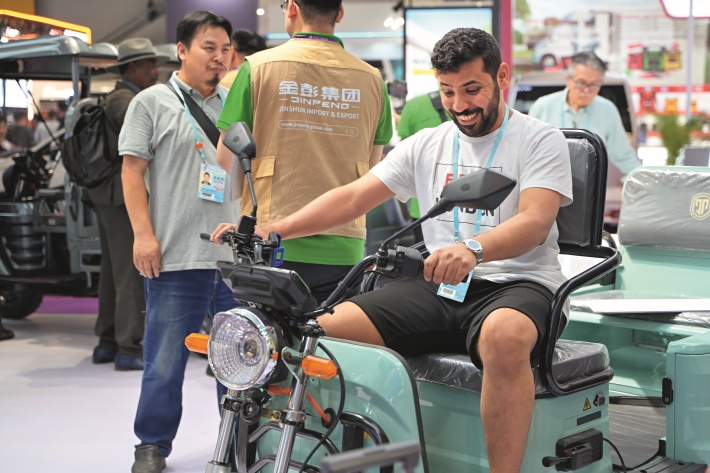|
||||||||||
| Home Nation World Business Opinion Lifestyle ChinAfrica Multimedia Columnists Documents Special Reports |
|
||||||||||
| Home Nation World Business Opinion Lifestyle ChinAfrica Multimedia Columnists Documents Special Reports |
| ChinAfrica |
| Green Carriers |
| E-mobility sparks transport revolution in Tanzania |
| By Xia Yuanyuan and Ephrahim Bahemu | VOL. 16 June 2024 ·2024-06-11 |

Buyers select motorcycles of Sinoray, a brand from China, in Dar es Salaam, Tanzania, in November 2011 (SINORAY MOTORCYCLE TZ)
In the bustling streets of Tanzania, riders move around mostly on made-in-China electric scooters, creating a silent revolution in which the quiet hum of electric motors is replacing the roar of gasoline engines.
This shift is further testified by the growing popularity of electric three-wheeled auto rickshaw, or bajaji, as a mode of transportation in Dar es Salaam, both for commercial and private use.
The Chinese-made electric tricycle allows for effortless driving, has space for both passengers and cargo, is affordable and does not require gasoline. These eco-friendly alternatives not only offer a cheaper mode of transportation, but also contribute to reducing carbon emissions in urban areas compared to the conventional minibuses that run on gasoline.
Tanzania is embracing e-mobility as a solution to rising fuel prices and environmental concerns. With petrol prices reaching as high as 3,314 Tanzanian shillings ($1.28) per litre, and the cost of electricity being as low as 350 shillings ($0.13) per kwh, people are ditching the gasoline-powered polluters in favour of the clean and green ones.
Cost-efficient choice
Daudi Yohana, a bajaji driver in Dar es Salaam, lauded the benefits of switching to electricity. “I can save up to 15,000 shillings ($5.78) per day. The running cost is low, with no engine service required,” he told ChinAfrica. Despite problems such as occasional power outages and the limited range of his battery, which lasts for approximately 120 km, Yohana remains optimistic about the future of e-mobility.
Similarly, Jackson Ndiko, a university student in Dar es Salaam, relies on his Chinese-made electric scooter to navigate the city’s notorious traffic jams.
“I don’t need to refuel; I just charge at home. I can go anywhere I want, and my speedometer indicates the battery usage and remaining charge,” he told ChinAfrica, emphasising the convenience and cost-effectiveness of e-mobility.
Anna John, a boutique owner, has embraced a Chinese-made electric scooters for her delivery services, citing their affordability and convenience.
With two electric scooters at her disposal, she can efficiently reach her customers at minimal cost, highlighting the utility of electric vehicles for business.

A buyer tries an electric tricycle at the 135th Canton Fair in Guangzhou, Guangdong Province, on 15 April (CNS)
Increasing demand
Despite Tanzania’s position as a leading adopter of e-mobility in East and Central Africa, the transition to four-wheeled electric vehicles (EV) has been slow. Concerns about battery range and the lack of charging infrastructure persist among potential users.
However, EV adoption is expected to accelerate after the country expands its power grid. With plans to add over 2,000 mw to its grid, Tanzania aims to ensure affordable and reliable electricity supply, laying the foundation for widespread adoption of EVs. As the nation continues to invest in renewable energy and infrastructure development, the prospects for e-mobility as a sustainable transportation solution are brighter than ever.
Recent government initiatives, including the reduction of import duty and value-added tax on EVs and assembling parts, have also created a conducive environment for the growth of e-mobility in Tanzania.
In the streets of Tanzania, the quiet revolution of e-mobility is reshaping the way people move, promising a greener and more efficient future for all.
Chinese providers
Most bajajis in Africa are imported from east China’s Jiangsu Province. According to Qilu Evening News, data from cross-border e-commerce platform Alibaba shows that the sales volume of electric tricycles produced in Jiangsu Province has ranked first in the world for 13 consecutive years.
In Jiangsu Province, Xishan District of Wuxi City is dubbed the Chinese capital of electric motorcycles. Official figures show that more than 22 million electric motorcycles rolled off the production line here in 2022, accounting for around one-third of the nation’s annual output and generating some 66 billion yuan ($9.2 billion) in revenue.
Shen Yu, secretary general of the Xishan District Electric Vehicle International Trade Association, estimates that the national average growth of electric motorcycle exports in 2023 reached 20 percent despite a sluggish global economy. From Xishan alone, more than 160 motorcycle makers are exporting their products to over 140 countries and regions, he said.
Statistics show that six of China’s top 10 electric motorcycles manufacturers are located in Xishan, including Yadea Group Holdings Ltd., a leading electric bike manufacturer in China, which is headquartered in Xishan.
In January, Jiangsu Feimi Automobile Industry Co., Ltd. signed a cooperation agreement with the China-Africa Economic, Trade and Investment Promotion Association to export 50,000 electric tricycles to Tanzania.
Peng Xinhua, general manager of the company, told ChinAfrica that the Feimi tricycle has a large-capacity battery that can be charged by solar charging panels installed on its roof, and it can reach a speed of more than 50 km per hour. With long endurance, low energy consumption and high performance, these electric motorcycles provide a viable alternative to gasoline vehicles.
“This model has 5-10 times lower running cost compared with gasoline vehicles over the same distance,” he said.
According to Lin Hao, director of international affairs at made-in-China.com, Chinese electric tricycles are popular partly because they can transport both people and goods. This type of vehicle has been manufactured in China for more than 20 years. The industrial chain is mature and product quality is guaranteed. Nowadays, various countries are paying more and more attention to energy conservation and emission reduction, and encouraging people to replace fuel vehicles with electric vehicles. The popularity of electric tricycles confirms this trend.
|
||||||||||||
| About Us | Contact Us | Advertise with Us | Subscribe |
| Copyright Beijing Review All rights reserved 京ICP备08005356号-5 京公网安备110102005860号 |